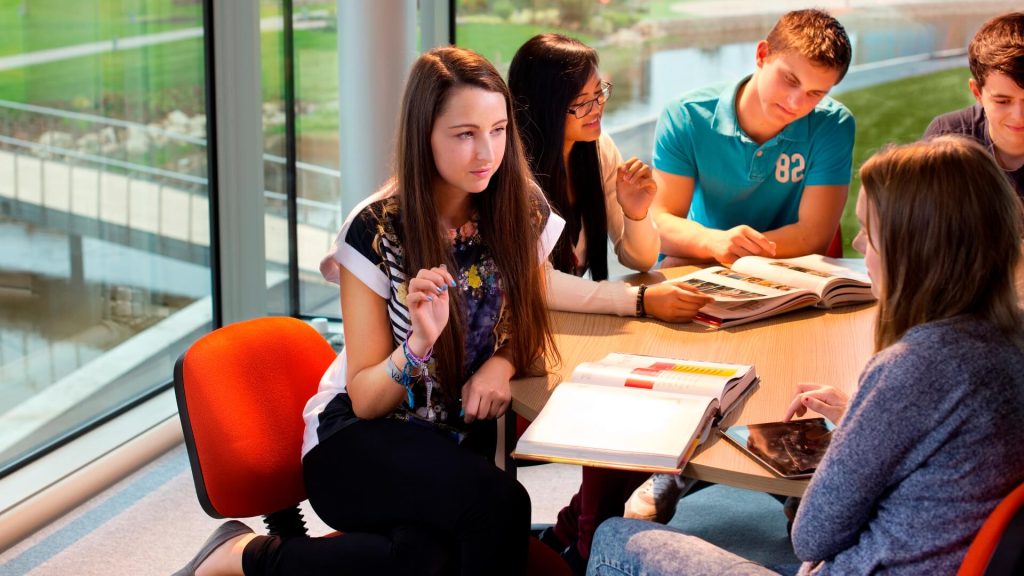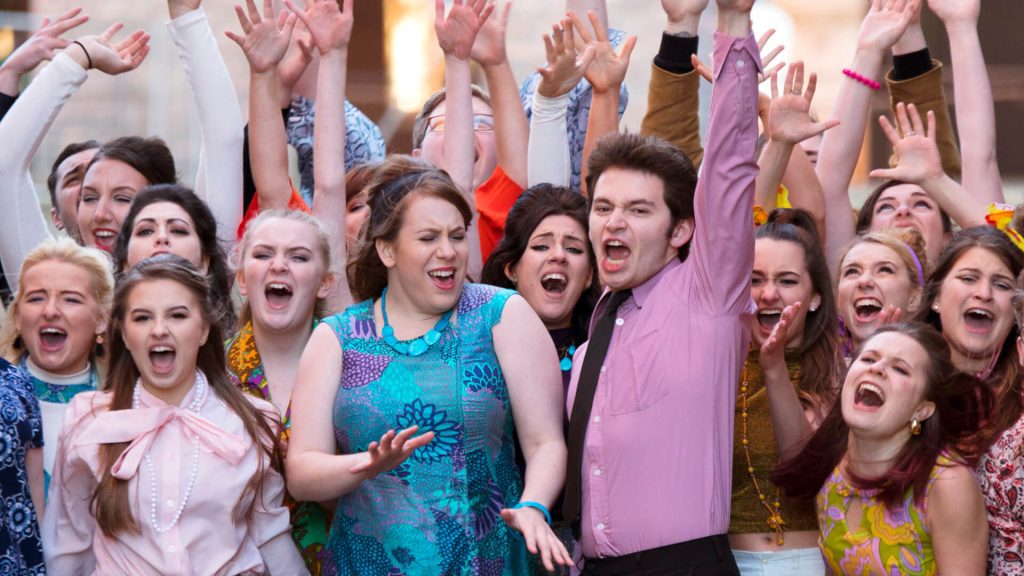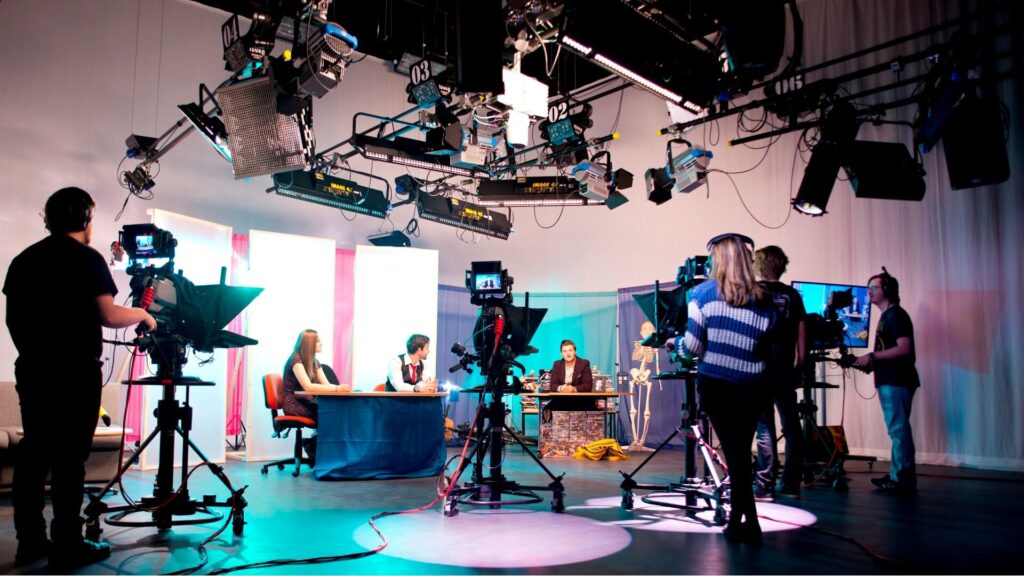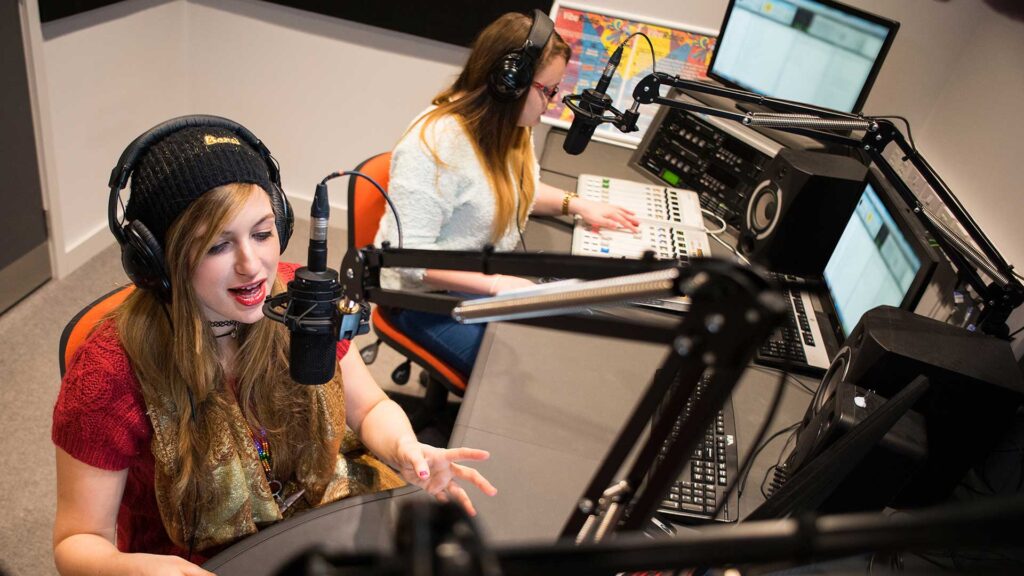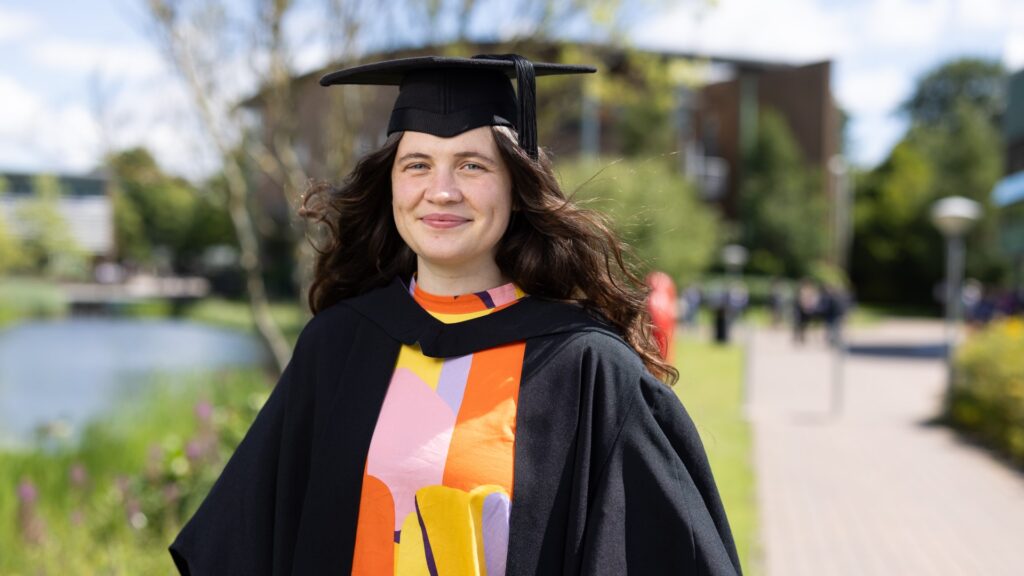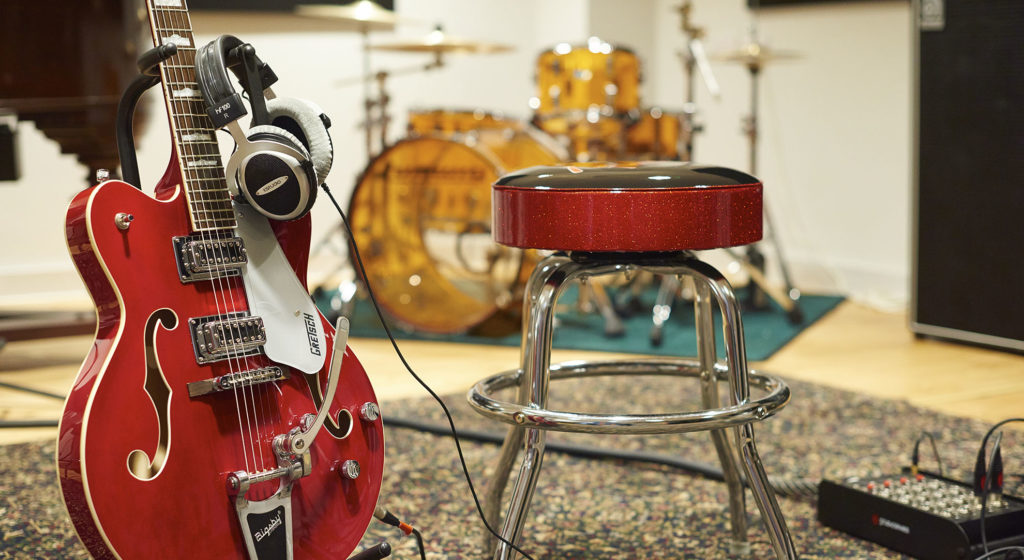Music Production BA (Hons)
UCAS code: M235
Create, record and perform your own songs in an environment where your artistic talent will be nurtured. You’ll develop your craft in our well-equipped, on-campus studios. And specialist modules will help broaden your appreciation of music and sound.
Overview
| Course length: | 3 years full-time 6 years part-time |
|---|---|
| Start dates: | September 2024 September 2025 |
| Location: | Edge Hill University |
| Example offers: | BBC-BBB (A Level) or DMM (BTEC) View full entry criteria |
| Subject(s): | Music Production |
| Faculty: | Arts and Sciences |
| Department: | English and Creative Arts |
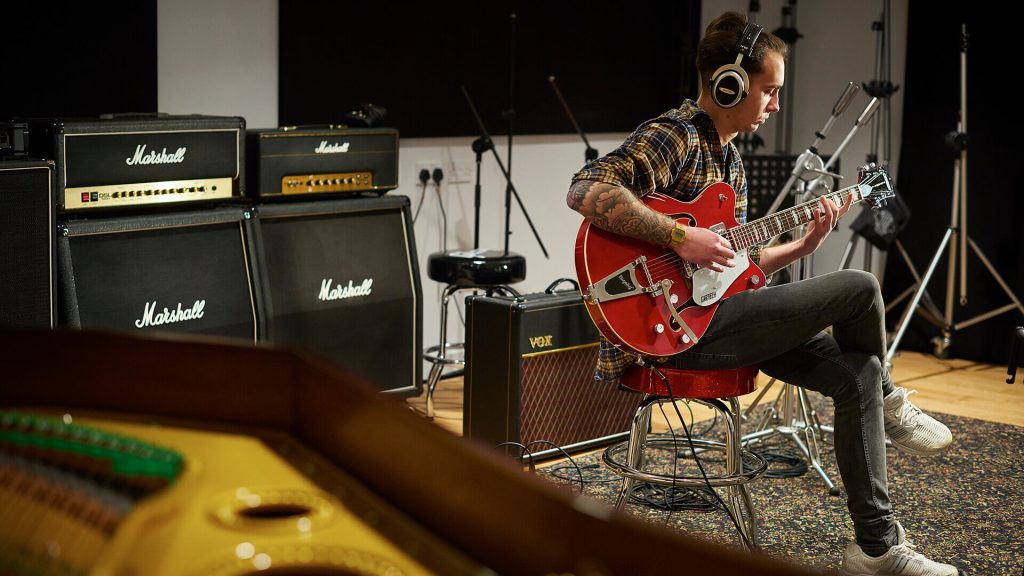
Ready to develop and unleash your creative potential? Studying our music production course, you’ll uncover music and sound’s diverse characteristics by exploring technology, sound design, composition, production and mastering, and social media. And we’ll share advice on how to search for jobs in the music business.
The course includes studio practice, songwriting and recording, production and mastering, arranging popular music and composing for film. You’ll explore the areas that interest you, using professional equipment in our studios. Our Creative Arts buildings include three recording studios, two television studios, two theatres, and many rehearsal spaces.
You’ll feel part of the industry even as a student. We regularly invite our connections to give guest lectures, so you can build your network and explore real challenges facing professionals. So when you finish your degree you’ll be ready to kick-start your career in the music industry.
Course features
-
International students can apply
-
Learn a language option available
-
Sandwich year option available
-
Studying abroad option available
What you'll study
In Year 1, you’ll trace the history of popular music. Improve your musicianship composing and performing songs with others. You’ll gain hands-on experience with computer and studio based music technology and take part in ensemble performance. Optional modules let you explore the psychology and sociology of music, sound for the moving image, and develop music literacy.
There’s greater focus on composition, performance and recording in year 2. You’ll uncover the research methods behind music, media and sound. Choose to learn about electronic music and synthetic sound design, arranging popular music or performing live. There’ll be opportunities to review live performances, and to play to audiences in live music venues.
In the final year of the music production course, you’ll enhance your production skills, and get advice on securing work in the creative industries. You’ll complete a personal research project and refine your musicianship. You’ll have chances to compose music for film, use technology for digital performances, and engage with the social media marketing that underpins music download culture.
Where your course includes optional modules, these are to provide an element of choice within the course curriculum. The availability of optional modules may vary from year to year and will be subject to minimum student numbers being achieved. This means that the availability of specific optional modules cannot be guaranteed. Optional module selection may also be affected by timetabling requirements. Some restrictions on optional module choice or combinations of optional modules may apply.
How you'll study
As you study you will encounter a range of teaching methods and learning experiences designed to guide you in becoming a self-directed, autonomous learner, conscious of professional practice principles and ethics. In addition to tutor-focused instruction in lectures, seminars and workshops, there will also be opportunities for you to participate in work-related tasks and projects, group activities, individual tutorials, self-directed study and self-evaluation.
How you'll be assessed
The programme is assessed predominantly by coursework. This includes practical desktop (DAW/MIDI) and studio-based recording assignments, report writing, blogs, videos and oral presentations. You will also have the opportunity to complete a dissertation or practical project in the final year of the programme.
There are no formal written examinations as part of the current assessment methods on this degree.
Who will be teaching you
The programme is delivered by a team of academics, professional practitioners and technical staff with creative expertise spanning a wide range of disciplines. These areas of expertise include performance and production, music theory, media and culture, film and TV production, sound for picture and sound design, experimental music, songwriting, research and practice-led research. Many of the staff who teach on the programme are practising musicians themselves.
Entry criteria
Entry requirements
Typical offer 112-120 UCAS Tariff points, preferably to include a music-related subject.
Other subjects will be considered if you can demonstrate your ability to create music, either as an electronic musician, or by playing a musical instrument (such as vocals, guitar, keyboard, bass, drums, percussion or brass), either in a band or as a solo artist.
No formal grade or professional qualification in playing a musical instrument is required but, in the absence of a Music-related subject to contribute towards the UCAS Tariff points, you will need to supply evidence in the form of video and/or audio recordings of songs and music created and performed. Recordings should be uploaded to SoundCloud and/or YouTube and the links to them put in your UCAS personal statement. In some circumstances, we may also invite you to attend an audition workshop.
Example offers
| Qualification | Requirement |
|---|---|
| A Level | BBC-BBB. |
| BTEC Extended Diploma (or combination of BTEC QCF qualifications) | Distinction, Merit, Merit (DMM). |
| T Level | Overall grade of Merit. |
| International Baccalaureate (IB) | We are happy to accept IB qualifications which achieve the required number of UCAS Tariff points. Subject-specific requirements at Higher Level (HL) Grade 5 may apply. |
| Access to Higher Education Diploma | 45 credits at Level 3, for example 15 credits at Distinction and 30 credits at Merit or 24 credits at Distinction and 21 credits at Merit. The required total can be attained from various credit combinations. |
Please note, the above examples may differ from actual offers made. A combination of A Level and BTEC awards may also be accepted.
If you have a minimum of two A Levels (or equivalent), there is no maximum number of qualifications that we will accept UCAS points from. This includes additional qualifications such as Extended Project Qualification (EPQ), AS Levels that haven't been continued to A Level, and General Studies AS or A Level awards.
English language requirements
International students require IELTS 6.0, with a score no lower than 5.5 in each individual component, or an equivalent English language qualification.
If your current level of English is half a band, one band, or one-and-a-half bands lower, either overall or in one or two elements, you may want to consider our Pre-Sessional English course.
How to apply
Apply full-time
Read our guide to applying through UCAS to find out more about the application process.
International
Please see our international student pages for further information about how to apply as a prospective international student.
Part-time applications require a direct application to Edge Hill. Please select the year of entry that you wish to apply for.
Should you accept an offer of a place to study with us and formally enrol as a student, you will be subject to the provisions of the regulations, rules, codes, conditions and policies which apply to our students. These are available at www.edgehill.ac.uk/studentterms.
If you join a full time undergraduate degree at Edge Hill University, we will guarantee you the offer of a room in our halls of residence for the first year of your course.
Discover our accommodation
Facilities
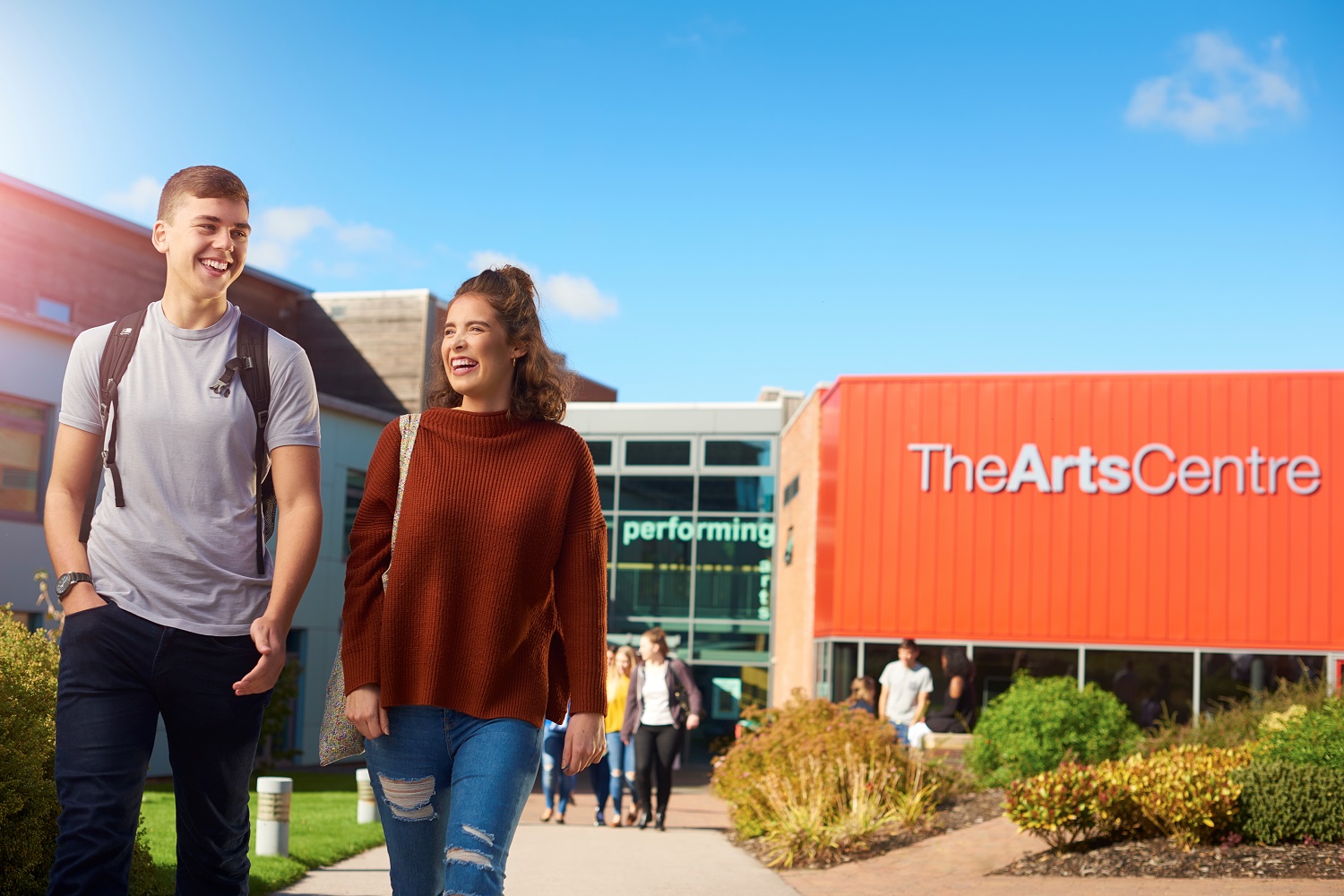 Music Production students at Edge Hill University enjoy industry-standard teaching and learning facilities in the £7million Arts Centre and £17million Creative Edge.
Music Production students at Edge Hill University enjoy industry-standard teaching and learning facilities in the £7million Arts Centre and £17million Creative Edge.
The Department of English and Creative Arts’ outstanding resources ensure you gain practical experience to a professional standard. Contemporary performance environments include the Rose and Studio theatres, digital sound studio, digital design suite, music technology room, music practice studios, radio studio, multimedia laboratory, TV studio, and an outdoor amphitheatre.
The Arts Centre hosts a diverse range of high-quality productions and performers, including comedy, dance, drama and music, designed to supplement English and Creative Arts programmes and entertain both students and the local community.
Where you'll study
Arts Centre
Creative Edge
Learning resources
Music production and audio post-production studios come equipped with AVID ProTools HDX digital recording systems with C|24 control surfaces, as well as Waves and IK Multimedia, and a range of microphones. Dedicated Mac labs provide access to the latest audio software while there are several dedicated rehearsal rooms which offer electronic keyboards and a range of acoustic and electric guitars, effects modules and practice amps. A selection of acoustic pianos, grand and upright, are also available.
Finance
Tuition fees
UK Full-Time
£9,250
a year
UK Part-Time
£77 per credit
for 360 credits
International
£16,500
a year
EU/EEA and Swiss students who have settled or pre-settled status under the EU Settlement Scheme, as well as Irish nationals, may be eligible for the UK tuition fee rate.
Financial support
Subject to eligibility, UK students joining this course can apply for a Tuition Fee Loan from the Government to cover the full cost of tuition fees. UK students enrolling on the course may also be eligible to apply for additional funding to help with living costs.
Please view the relevant Money Matters guide for comprehensive information about the financial support available to eligible UK students.
EU/EEA and Swiss students who have settled or pre-settled status under the EU Settlement Scheme may be eligible to apply for financial support. Irish nationals can ordinarily apply to Student Universal Support Ireland (SUSI). If you are an EU student who does not have settled or pre-settled status, or are an international student from a non-EU country, please see our international student finance pages.
Your future career
Our music production degree will help you pursue a career which makes the most of your musical knowledge and abilities. After three years of industry-relevant study, you can start thinking about exploring freelance opportunities. Or start a career in artist management, in music studios or composing music for films and other creative industries.
Alternatively, you may think about studying music at postgraduate level, or training to be a teacher.
Course changes
Every effort has been made to ensure the accuracy of this information, however our courses are subject to ongoing review and development. Changing circumstances may necessitate alteration to, or the cancellation of, courses.
Changes may be necessary to comply with the requirements of professional bodies, revisions to subject benchmarks statements, to keep courses updated and contemporary, or as a result of student feedback. We reserve the right to make variations if we consider such action to be necessary or in the best interests of students.
